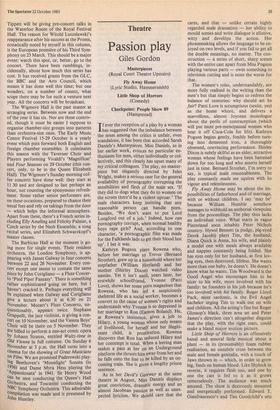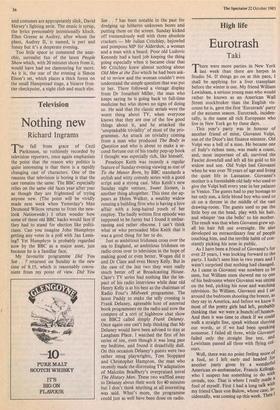Theatre
Passion play
Giles Gordon
Masterpieces (Royal Court Theatre Upstairs) Fly Away Home (Lyric Studio, Hammersmith) Little Shop of Horrors (Comedy) Checkpoint: People Show 89 (Hampstead)
If ever the reception of a play by a woman has suggested that the imbalance between the sexes among the critics is unfair, even scandalous, it has been that accorded Sarah Daniels's Masterpieces. Miss Daniels, as in her earlier work, evinces no particular en- thusiasm for men, either individually or col- lectively, and this clearly has upset many of my critical colleagues. The play, no master- piece but elegantly directed by Jules Wright, makes a serious case for the general availability of pornography corrupting the sensibilities and flesh of the male sex. 'If they did to dogs what they do to women on the screen there'd be a violent uproar.' The male characters keep insisting that any reasonable person can handle porn. Besides, 'We don't want to put Lord Longford out of a job.' Indeed, how can pornography corrupt, when normal healthy boys rape girls? And, according to one character, `a pornographic film was made for the Falklands lads to get their blood lust up'. I bet it was.
Kathryn Pogson plays Rowena who, before her marriage to Trevor (Bernard Strother), grew up in a household where her stepfather (William Hoyland) and her mother (Shirley Dixon) watched video nasties. Yet it isn't until, years later, her erstwhile schoolfriend, Yvonne (Patti Love), shows her some porn magazines that Rowena, who has led a suspiciously sheltered life as a social worker, becomes a convert to the cause of women's rights and understands why Yvonne is so depressed in her marriage to Ron (Eamon Boland). He, at Rowena's insistence, gives a job to Hilary, a young woman whose only means of livelihood, for herself and her illegiti- mate child, is prostitution. Rowena discovers that Ron has seduced Hilary and her contempt is total. When a leering man makes a pass at her on an Underground platform she thrusts him away from her and he falls onto the line to be killed by an on- coming train. She is given a lengthy prison sentence.
As in her Devil's Gateway at the same theatre in August, Miss Daniels displays great conviction, dramatic energy, and an almost Jacobean passion as well as unex- pected lyricism. We should care that she
cares, and that — unlike certain highly regarded male dramatists — her ability to mould scenes and write dialogue is allusive, witty and develops the action. Her phrasemaking allows the language to be en- joyed on two levels, and if you fail to get all the double meanings, no matter. The con- struction — a series of short, sharp scenes with the entire cast apart from Miss Pogson playing various parts — owes something to television cutting and is none the worse for that.
The women's roles, understandably, are more fully realised in the writing than the men's but that simply begins to redress the balance of centuries: why should art be fair? Patti Love is scrumptious (sexist, yes) as the home whore, and delivers a marvellous, almost Joycean monologue about the perils of contraception (which will put most pre-menopausal women who hear it off Coca-Cola for life). Kathryn Pogson begins gently, freshly before turn- ing into demented iron, a thoroughly obsessed, convincing performance. Shirley Dixon is subtly skilful as an elder, attractive woman whose feelings have been battened down for too long and who asserts herself just in time. Bernard Strother, I'm sorry to say, is typical male reasonableness. The play constantly made me squirm with its vigour and relentlessness.
Fly Away Home may be about the im- possibilities of fatherhood and of marriage, with or without children. I say 'may be' because William Humble somehow manages to withhold an authorial viewpoint from the proceedings. The play thus lacks an individual voice. What starts in vague Pinterland soon inhabits Peter Nichols country. Hywel Bennett (a pudgy, pig-eyed Derek Jacobi) plays Tim, the husband; Diana Quick is Anna, his wife, and plainly a model one with meals always available and nappies constantly being folded. She has eyes only for her husband, at first lov- ing eyes, then destroyed, lifeless. She wants more than one baby, he doesn't. He doesn't know what he wants. Tim Woodward is the Good Angel who encourages him to be nicer to his wife, more involved with his family: he founders in his job because he's too involved with his family. Roger Lloyd Pack, most sardonic, is the Evil Angel bachelor urging Tim to walk out on wife and children. All the acting's fine but Roger Glossop's black, three area set and Peter James's direction can't altogether disguise that the play, with the right stars, could make a bland major motion picture.
Little Shop of Horrors is an offensively banal and amoral little musical about a plant — in its (presumably) foam rubber realisation, an unsubtle cross between the male and female genitalia, with a touch of Jaws thrown in — which, in order to grow big, feeds on human blood. Like Shylock in reverse, it requires flesh too, and one by one the cast is fed to it as it grows remorselessly. The audience was much amused. The show is dextrously mounted and energetically performed. Edward T. Gianfrancesco's and Tim Goodchild's sets and costumes are appropriately slick, David Hersey's lighting eerie. The music is syrup, the lyrics presumably intentionally kitsch. Ellen Greene as Audrey, after whom the plant, Audrey II, is named, is pert and funny but it's a desperate evening. Too little space to commend the anar- chic, surrealist fun of the latest People Show which, with 20 minutes shorn from it, would have had me clamouring for more. As it is, the star of the evening is Simon Elson's set, which places a thick forest on the small Hampstead stage, a bizarre fron- tier checkpoint, a night club and much else.















































 Previous page
Previous page